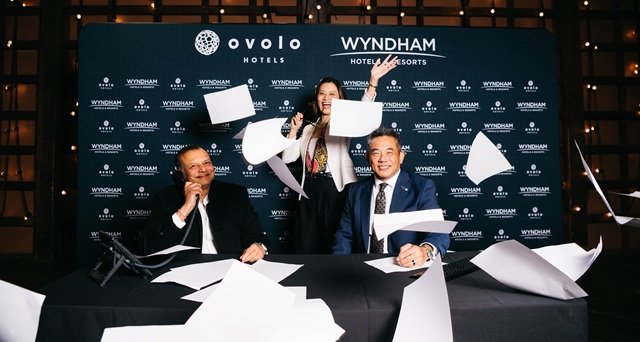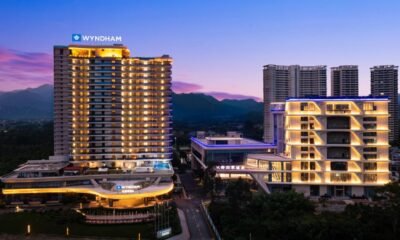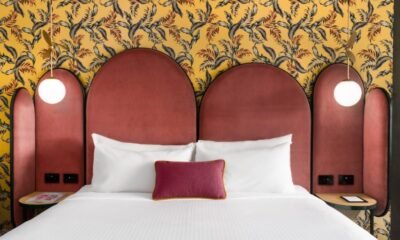Hotels & Accommodations
‘Flipping the script’: Ovolo, Wyndham sign APAC franchise deal

Five Ovolo hotels across Australia and Hong Kong will join the Wyndham hotel brand in the coming months, under a strategic partnership between Wyndham Hotels and Resorts and Ovolo Group.
Under the new deal, Ovolo Group will continue to own and manage the Ovolo brand while working exclusively with Wyndham on additional development opportunities throughout the Asia Pacific region.
“This partnership marks a significant milestone for Wyndham, further expanding our upscale presence in the Asia Pacific region by combining Ovolo’s strengths in the lifestyle segment with our extensive global network,” said Wyndham Hotels and Resorts President of Asia Pacific, Joon Aun OOI.
“The future of travel isn’t about sameness—it’s about spaces with soul, brands with a point of view and experiences that don’t blur into the background.”
The partnership intends to leverage both Ovolo’s status as a boutique lifestyle brand, as well as Wyndham’s global reach and infrastructure.
“Ovolo isn’t just a hotel brand, it’s a lifestyle, a creative force that fuses fashion, art, music and entertainment,” said Ovolo Group Chief of Staff, Shivang Jhunjhnuwala.
“Since 2010, we’ve built a bold, culture-led brand that disrupts the cookie-cutter hotel experience. Now through our partnership with Wyndham, we’re flipping the script to unlock bold new growth opportunities by franchising a lifestyle brand without diluting its DNA.
“Wyndham is a global leader in hotel franchising—with the scale, infrastructure, and expertise to help us grow with intention and impact. Just as importantly, Ovolo brings something different—an edge and energy that complements Wyndham’s presence in the upscale lifestyle market.”
The five existing Ovolo hotels, representing over 450 rooms, to join Wyndham’s global portfolio later this year, include Ovolo Central, a Wyndham Hotel (Hong Kong); Ovolo Nishi, a Wyndham Hotel (Canberra); Ovolo South Yarra, a Wyndham Hotel (Melbourne); Ovolo The Valley, a Wyndham Hotel (Brisbane); Ovolo Woolloomooloo, a Wyndham Hotel (Sydney).
Each property will be integrated into Wyndham’s sales, marketing and distribution platforms, and will participate in the Wyndham Rewards loyalty program, giving approximately 120 million enrolled members access to Ovolo’s lifestyle offerings.
The partnership comes amid booming consumer demand for experiential travel – a segment valued by McKinsey as a US$1 trillion opportunity globally, driven largely by younger travellers.
Wyndham has invested nearly $350 million in innovative technology since 2018, driving growth through its Wyndham Advantage marketing and distribution platform.
Hotels & Accommodations
US Hotel Industry Sees Mixed Performance in Week Ending July, St. Louis Showing Growth Amid Declines

Sunday, August 3, 2025
The latest data from CoStar, a leading provider of real estate analytics, paints a challenging picture for the US hotel industry for the week ending July 26, 2025. Despite recovery signs in certain markets, the overall year-over-year performance indicates slight declines in key metrics such as occupancy, average daily rate (ADR), and revenue per available room (RevPAR). These results reflect a mix of ongoing challenges in the hospitality sector, as well as regional variations across the country.
The overall trend of negative growth in hotel performance for the week compared to the same period in 2024 highlights the ongoing uncertainty facing the industry. However, the report also sheds light on specific markets, such as St. Louis, which recorded positive movement, contrasting the general trend. This article will delve into the details of the data and explore the implications for both hotel operators and travelers.
US Hotel Industry Performance Overview
For the week ending July 26, 2025, the US hotel industry experienced slight declines in all key performance metrics compared to the same week in 2024. The following are the reported figures for occupancy, ADR, and RevPAR:
- Occupancy: 71.5% (-0.7%)
- Average Daily Rate (ADR): $164.88 (-0.1%)
- Revenue per Available Room (RevPAR): $117.88 (-0.8%)
These figures indicate that while the hotel industry continues to experience a relatively strong level of occupancy, the overall revenue generated per available room remains under pressure. The decline in ADR by 0.1% and RevPAR by 0.8% suggests that hotels are still grappling with pricing pressures, particularly as travelers remain cautious about their spending.
Despite the slight year-over-year declines, the overall occupancy rate remains relatively healthy, indicating that demand for hotel accommodations is still stable, albeit with less momentum than in previous periods. However, challenges persist, especially in markets that are struggling to recover from unique regional disruptions.
St. Louis: A Bright Spot Amid the Decline
While many US markets have seen a decline in key performance metrics, St. Louis stands out as a notable exception. The city reported the highest occupancy increase among the Top 25 Markets for the week, with a 5.7% year-over-year rise in occupancy, bringing the rate to 70.9%. This increase can be attributed to a combination of factors, including targeted marketing campaigns, local events, and the city’s growing appeal as a mid-sized destination for both business and leisure travelers.
St. Louis has been positioning itself as a vibrant hub for tourism, with increased efforts to attract more visitors through cultural and recreational offerings. The strong occupancy growth in the city suggests that these efforts are beginning to pay off, as it bucks the overall downward trend seen across much of the US hotel industry.
The performance of St. Louis highlights the importance of localized factors in the hotel industry. While national trends may show overall stagnation or slight declines, specific markets are capable of outperforming the broader trends due to strategic initiatives, favorable local conditions, and the adaptability of hotel operators.
Houston: A Struggling Market
On the opposite end of the spectrum is Houston, which recorded the steepest declines in all three major performance indicators. The city saw a significant drop in occupancy, down by 19.7% to 61.1%. The ADR also fell by 7.7%, reaching $117.02, while RevPAR saw the sharpest decline, down by 25.9% to $71.54.
These declines are primarily attributed to the elevated displacement demand that followed Hurricane Beryl in 2024. Many hotels in Houston experienced a surge in bookings due to the temporary displacement of residents and business travelers during and after the hurricane. As the region returned to normal, this temporary spike in demand was not sustained, leading to a sharp decrease in performance metrics.
Houston’s struggles serve as a reminder of how external factors, such as natural disasters and regional disruptions, can significantly impact hotel performance. As recovery efforts continue, it is essential for operators in affected regions to manage expectations and plan accordingly to regain stable occupancy levels.
Regional Variations and Market Adaptations
The US hotel industry is highly diverse, and performance trends can vary significantly from one region to another. In addition to the notable performances in St. Louis and Houston, other markets are showing mixed results. Cities with strong business travel demand, such as New York and Los Angeles, are likely to continue to perform relatively well, while more leisure-focused destinations might experience fluctuations depending on seasonal trends and consumer confidence.
The key to navigating this complex landscape will be for hotel operators to adapt their strategies based on local demand drivers. With the recovery from the COVID-19 pandemic continuing to evolve, it is crucial for hotels to remain agile, adjusting pricing, marketing, and service offerings to meet changing consumer needs.
Looking Ahead: A Challenging Road for US Hotels
The US hotel industry faces a mixed outlook as it continues to recover from the disruptions of the past few years. While key markets such as St. Louis show promising growth, other cities like Houston are grappling with the aftermath of regional challenges. The slight year-over-year declines in occupancy, ADR, and RevPAR indicate that the road to full recovery will be slow and uneven, with some regions bouncing back more quickly than others.
For hotel operators, the focus must remain on improving efficiency, maintaining high service standards, and responding swiftly to emerging trends. Additionally, keeping track of local market conditions will be vital for adapting to the demands of travelers in a post-pandemic world. As the industry continues to adjust to changing travel patterns, operators will need to stay ahead of the curve by focusing on delivering value to their guests while managing operational costs.
Conclusion
The latest data from CoStar paints a picture of a hotel industry in transition, facing both challenges and opportunities. While national trends indicate slight declines in key performance metrics, specific markets like St. Louis show that targeted strategies and regional initiatives can yield positive results. Meanwhile, cities like Houston remind us that external factors such as natural disasters can have a long-lasting impact on hotel performance.
As the US hotel industry navigates these challenges, the focus must remain on adaptability, efficiency, and customer satisfaction. The ability to respond to local demands and capitalize on emerging trends will be crucial to maintain profitability and sustaining long-term growth. With the hospitality sector continuing to recover, it is clear that the industry is in a period of flux, but the potential for success remains strong in markets that can adjust and innovate effectively.
Hotels & Accommodations
Royal Holdings in tie-up to open 21 luxury hotels in Japan by 2035

Restaurant operator Royal Holdings Co. is teaming up with Minor Hotels, the largest hotel group in Southeast Asia, to develop luxury hotel accommodation in the Japanese market.
The company plans to open 21 hotels across Japan by 2035, targeting wealthy foreign tourists from the more than 36 million people who visit each year.
Based in Thailand, Minor Hotels operates more than 560 luxury hotels and resort facilities in 57 countries.
It is also a member of the Global Hotel Alliance, the world’s largest alliance of independent hotel brands, serving 30 million members.
It will be Minor Hotels’ first foray into Japan.
Royal Holdings and Minor Hotels established a joint venture earlier this year.
On July 10, they unveiled plans to open Anantara Karuizawa Retreat, a hotel and resort facility, in Karuizawa, Nagano Prefecture, in 2030, partnering with general real estate firm List Group.
Anantara is Minor Hotels’ flagship brand.
Situated on a 42,000-square-meter plot overlooking Mount Asamayama, the facility will have 51 guest rooms, of which 23 are suites, It will also boast a spa, swimming pool and restaurants.
The companies are preparing to apply for confirmation for construction.
Accommodation fees and other details have yet to be determined.
William Heinecke, founder and chairman of Minor International, which operates Minor Hotels under its umbrella, told a news conference in Tokyo that Japan is the first choice of overseas destination for Thai people.
He expressed gratitude that the globally recognized hotel brand of Anantara had been accepted in the Japanese market.
Royal Holdings started in-flight catering services and operating a cafe at Fukuoka Airport in 1951.
The company has operated the Royal Host family restaurant chain as well as the Shakey’s pizza chain since the 1970s.
In addition, it operates restaurants at airports, expressway facilities and hospitals, and runs Tenya, a restaurant chain specializing in tempura rice bowls.
As for its hotel business, the company opened its first Roynet Hotel (present-day Richmond Hotel) in 1995. It currently manages 43 Richmond Hotels, which target business travelers.
“We want to operate hotels aimed at wealthy visitors from abroad in tourism destinations and cities around the country as a way to expand the scope of our business,” said Royal Holdings President Masataka Abe.
Hotels & Accommodations
Arrests after asylum hotel protests in England

A series of protests outside the migrant hotels have been taking place in recent weeks.
The protest in London on Saturday was held outside of the Thistle City Barbican Hotel in Islington, with a counter-protest led by the group Stand Up To Racism.
The Met said the protest was organised by local residents under the banner “Thistle Barbican needs to go – locals say no”.
But police said it had been “endorsed by groups from outside the local community which is likely to increase the number of people attending”.
The MP for Islington North, former Labour Party leader Jeremy Corbyn had urged people to join the counter-protest.
The police had imposed special restrictions ahead of the London demonstration, including setting out specific areas where each group had to remain.
In Newcastle, a protest and counter-protest took place outside The New Bridge Hotel.
Four people were arrested and remain in custody, according to Northumbria Police.
“The right to lawful protest is a key part of any democracy, which the police uphold,” a spokesperson for the force said.
“However, we will not accept people using them as a means to commit crime or disorder.”
About 1,500 people waved England and Union flags in a march organised by the Britain First group from Manchester Piccadilly rail station to outside the Central Library, where they held a rally.
About 250 people were also estimated to be at a counter-demonstration led by the Stand up to Racism organisation, with police keeping the groups apart in St Peter’s Square.
Greater Manchester Police said that a “number of demonstrations passed by peacefully” with “no incidents of note”.
But two arrests were made during a confrontation at the start of the march, the statement added.
One person was arrested for theft and the other for obstructing an arrest.
-

 Brand Stories2 weeks ago
Brand Stories2 weeks agoBloom Hotels: A Modern Vision of Hospitality Redefining Travel
-

 Brand Stories1 week ago
Brand Stories1 week agoCheQin.ai sets a new standard for hotel booking with its AI capabilities: empowering travellers to bargain, choose the best, and book with clarity.
-

 Destinations & Things To Do2 weeks ago
Destinations & Things To Do2 weeks agoUntouched Destinations: Stunning Hidden Gems You Must Visit
-

 Destinations & Things To Do1 week ago
Destinations & Things To Do1 week agoThis Hidden Beach in India Glows at Night-But Only in One Secret Season
-

 AI in Travel2 weeks ago
AI in Travel2 weeks agoAI Travel Revolution: Must-Have Guide to the Best Experience
-

 Brand Stories4 weeks ago
Brand Stories4 weeks agoVoice AI Startup ElevenLabs Plans to Add Hubs Around the World
-

 Brand Stories3 weeks ago
Brand Stories3 weeks agoHow Elon Musk’s rogue Grok chatbot became a cautionary AI tale
-

 Asia Travel Pulse4 weeks ago
Asia Travel Pulse4 weeks agoLooking For Adventure In Asia? Here Are 7 Epic Destinations You Need To Experience At Least Once – Zee News
-

 AI in Travel4 weeks ago
AI in Travel4 weeks ago‘Will AI take my job?’ A trip to a Beijing fortune-telling bar to see what lies ahead | China
-

 Brand Stories4 weeks ago
Brand Stories4 weeks agoChatGPT — the last of the great romantics













You must be logged in to post a comment Login